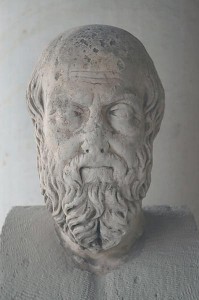Herodotus (7)
Herodotus of Halicarnassus (c.480-c.429 BCE): Greek researcher, often called the world's first historian. In The Histories, he describes the expansion of the Achaemenid Empire under its kings Cyrus the Great, Cambyses, and Darius I the Great, culminating in Xerxes' expedition to Greece (480 BCE), which met with disaster in the naval engagement at Salamis and the battles at Plataea and Mycale. Herodotus' book also contains ethnographic descriptions of the peoples that the Persians have conquered, fairy tales, gossip, and legends.
Herodotus the Moralist

To Herodotus the teller of tales, these 'world inverted' stories must have been among his greatest successes. Nothing was more funny to a Greek than to hear about Egypt, where women urinate standing. But Herodotus never presents it as if he is joking. Strange customs have his sincere interest, not his contempt. It is as if he wants to show how much diversity there can be in human culture: other cultures are not just a little bit dissimilar, they can be completely different.
Knowing this, the critical observer will understand that he or she can be a complete stranger to others. The only way to cope with other cultures is tolerance, because no society can claim superiority. This is best explained by Herodotus' own words, when he expresses his own feelings about the story of the madness of Cambyses. As we have seen, this Persian king killed the sacred Apis bull, his brother Smerdis, the son of his vizier and twelve noblemen. On top of that, he had started an incestuous affair with two of his sisters and desecrated Egyptian tombs and mummies.
In view of all this, I have no doubt that Cambyses was completely out of his mind; it is the only possible explanation of his assault upon, and mockery of, everything which ancient law and custom have made sacred in Egypt. If anyone, no matter who, were given the opportunity of choosing from amongst all the nations in the world the set of beliefs which he thought best, he would inevitably -after careful considerations of their relative merits- choose that of his own country. Everyone without exception believes his own native customs, and the religion he was brought up in, to be the best; and that being so, it is unlikely that anyone but a madman would mock at such things. There is abundant evidence that this is the universal feeling about the ancient customs of one's country.
One might recall, for example, an anecdote of Darius. When he was king of Persia, he summoned the Greeks who happened to be present at his court, and asked them what they would take to eat the dead bodies of their fathers. They replied that they would not do it for any money in the world. Later, in the presence of the Greeks, and through an interpreter, so that they could understand what was said, he asked some Indians of the tribe called Callatiae, who do in fact eat their parents' dead bodies, what they would take to burn them. They uttered a cry of horror and forbade him to mention such a dreadful thing. One can see by this what custom can do.note
Again: reversion. And more than that: a reversion that shows that people simply must accept that foreign nations have foreign customs. It is useful to take a final look at the list of Cambyses' crimes: the murder of his brother, incest and unjustified executions are mentioned without comment. What causes the above quoted remark, are the killing of the Apis and the profanation of mummies: intolerance is what causes Herodotus' indignation. No one but a madman would mock a foreign culture.
Further reading
There are several commentaries on Herodotus. Asheri, Lloyd and Corcella, A Commentary on Herodotus Books I-IV (2007) is now the main text, but has not yet fully replaced the old Commentary on Herodotus by W.W. How and J. Wells. Excellent is the commentary on Herodotus. Book Two by Alan Lloyd. Its three volumes appeared in Leiden between 1975 and 1988. They are a treasury of information on Herodotus' Egyptian logoi and have an important appendix on chronology; the corresponding chapters in the Asheri/Lloyd/Corcella commentary are essentially a summary and update of these books.
J. Gould's study on Herodotus (1987 London) is a good introduction and gives enough clues to find more specialized literature. Brill's Companion to Herodotus by Egbert Bakker, Irene de Jong and Hans van Wees (eds.; 2002 Leiden) is your guide for further study. Important is Pierre Briant's study on the Achaemenid Empire, Historie de l' empire Perse. De Cyrus a Alexandre (1996 Paris). It is the first comprehensive study of the subject. Those interested in Herodotus' Greek topography must try to obtain Dietrich Müller's Topographischer Bildkommentar zu den Historien Herodotos', I: Greece 1987 Tübingen; II: Asia Minor 1997 Tübingen).
Some specialized literature: Silvana Cagnazzi's article "Tavola dei 28 logoi di Erodoto" on Herodotus' logoi can be found in the journal Hermes 103 (1975), page 385-423. Fehling's Die Quellenangabe bei Herodot. Studien zur Erzählkunst Herodots was published in 1971 in Berlin (English translation: Herodotus and his "sources". Citation, invention and narrative art, 1989 New York). It should be supplemented by R. Rollinger, Herodots babylonischer Logos. Eine kritische Untersuchung der glaubwürdigkeitsdiskussion (1993, Innsbruck). On the functions of the ethnographical digressions in general: Rosaria Vignolo Munson, Telling Wonders: Ethnographic and Political Discourse in the Work of Herodotus (2002 Ann Arbor).
On the Persian Wars, one might read C. Hignett's very detailed and clever Xerxes' invasion of Greece (1963). A.R. Burn's Persia and the Greeks. The defence of the West, c.546-478 B.C. (second edition: 1984 London) also discusses some cuneiform evidence. One could also read Peter Green's The Greco-Persian wars (1996, Berkeley), which is a revised and updated edition of an older book.